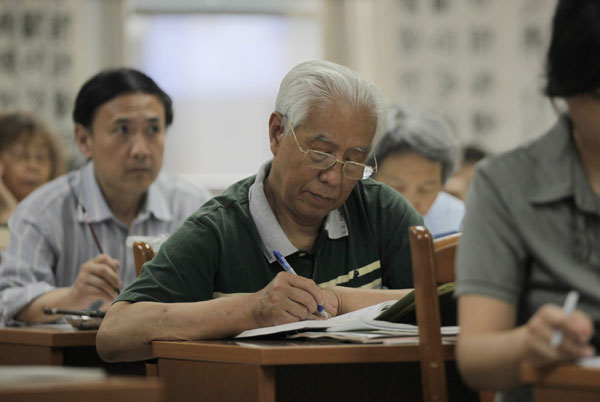Never too old to learn new tricks
Updated: 2013-05-29 08:37
By Luo Wangshu (China Daily)
|
||||||||
Oversubscribed schools
 |
|
Students take notes in a calligraphy class. [Photo by Wang Jing / China Daily] |
Figures from the Ministry of Civil Affairs show that by the end of 2009, around 12.5 percent of the Chinese population was aged 60 or older. At 167 million, the figure is greater than the populations of some of China's neighbors, such as Russia or Japan.
In China, many women retire between the ages of 50 to 55, while for men the figure is usually 55 to 60. Many are still energetic and keen to resume education.
China's retired population will reach 221 million by 2015, according to Yuan's estimate, so it's important to open more schools for seniors to cater for the rising demand.
In 2005, the number of retiree students was approximately 2.34 million. By 2011, that number had doubled to nearly 5 million.
BHUS provides 79 classes, 72 of them in painting and calligraphy. Others include computing and photography.
Xiong Zhenchang, director of the school's admissions office, said they underestimated the demand for enrolment in December. Having expected around 80 people, the staff found twice that number waiting outside the building when they arrived at 6:30 am. "The applicants had lined up long before we arrived," said Xiong. His concern has now shifted to registration day for the autumn semester, which will be held in June.
"Applicants are likely to arrive earlier in summer than in winter," he said, adding that the school plans to run 14 classes and recruit 623 new students this fall.
Song Qing left home at around 3:30 am on registration day and arrived at the school about 45 minutes later. Her husband drove her to the school because public transport doesn't visit that area in the early morning. "My husband is very supportive," Song said gratefully.
However, despite her early start, Song was not first in line. "I saw a woman in her late 60s sitting on a stool, waiting to register," she said. The woman told Song that she had stayed overnight at a nearby motel so she could arrive early and be sure of a place.
While BHUS is open to the public, many schools aren't, making it hard for outsiders to gain entry. The CAS College for the Elderly is one of them. The school, established in 1985, has 11 branches nationwide and its Beijing campus provides 48 classes for more than 1,400 students.
However, nearly 80 percent of the students are retired CAS employees or members of their families. "We'd love to offer more seats to public applicants, but the tuition fee is very low and the academy provides a subsidy for each place. We just don't have enough funding to subsidize public applicants," said Sun Jianguo, president of the CAS College for the Elderly, and also vice-director of the China Association of the Universities for the Aged.

 Michelle lays roses at site along Berlin Wall
Michelle lays roses at site along Berlin Wall
 Historic space lecture in Tiangong-1 commences
Historic space lecture in Tiangong-1 commences
 'Sopranos' Star James Gandolfini dead at 51
'Sopranos' Star James Gandolfini dead at 51
 UN: Number of refugees hits 18-year high
UN: Number of refugees hits 18-year high
 Slide: Jet exercises from aircraft carrier
Slide: Jet exercises from aircraft carrier
 Talks establish fishery hotline
Talks establish fishery hotline
 Foreign buyers eye Chinese drones
Foreign buyers eye Chinese drones
 UN chief hails China's peacekeepers
UN chief hails China's peacekeepers
Most Viewed
Editor's Picks

|

|

|

|

|

|
Today's Top News
Shenzhou X astronaut gives lecture today
US told to reassess duties on Chinese paper
Chinese seek greater share of satellite market
Russia rejects Obama's nuke cut proposal
US immigration bill sees Senate breakthrough
Brazilian cities revoke fare hikes
Moody's warns on China's local govt debt
Air quality in major cities drops in May
US Weekly

|

|







